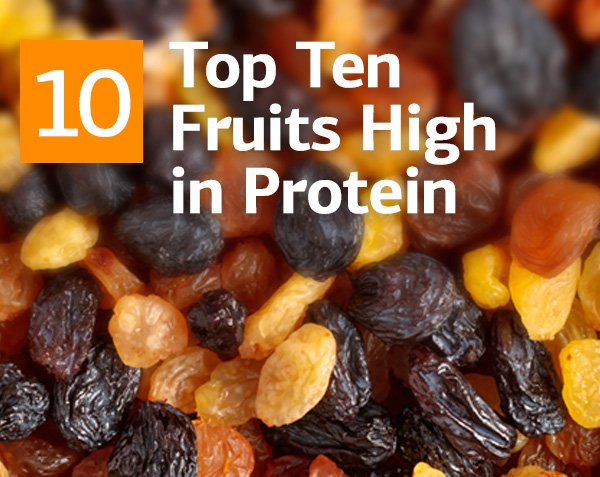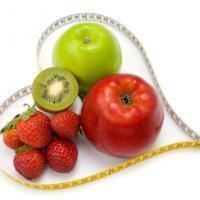Top 10 Fruits High in Protein
As a matter of fact, fruits can't be used as a main source of protein, because their protein ratio is relatively low and in order to satisfy your daily need, you will have to eat kilograms of them, which is a hard thing to do. Still, regular consumption of fruit will help you to round up your daily protein intake, but the trick is to choose the right types of fruit. Here is the list of fruits with the highest protein level, ranked in descending order. Eating them on a daily basis, you will not only provide your body with plant protein, but also load yourself up with essential nutritional elements – vitamins and minerals. Fruit also help to fight toxins and free radicals, keeping your body young and healthy.
1. Dried apricots
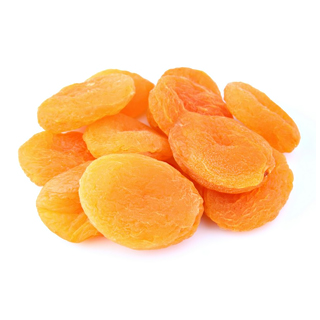
| Apricots, Dried, Sulfured, Uncooked | |
| 100 g | 1 cup, halves (130 g) |
| Protein: 3.4 g (7% DV) |
Protein: 4.4 g (9% DV) |
Dried apricots hold the first place on our list, because 100g of them provide you with roughly 3.5g of protein or 7% of average daily need (for an adult). Most of the dried fruits have an advantage over the fresh fruits, because all the useful substances are concentrated. On the other hand, dried fruits have a high concentration of sugar, that’s why eating them isn’t recommended for people, who want to lose weight and for diabetics. Apart from the protein they provide, dried apricots are rich in vitamin A, which protects the human body from harmful free radicals and helps fighting eye diseases. This fruit is also a stockpot of potassium, which is needed to maintain stable blood pressure, and fiber, which facilitates digestion and removes toxins from the body.
2. Raisins
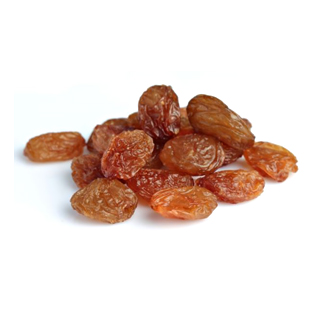
| Raisins, Seedless | |
| 100 g | 1 cup, packed (165 g) |
| Protein: 3.1 g (6% DV) |
Protein: 5.1 g (10% DV) |
Raisins are the next protein-loaded fruit with similar protein ratio. Fresh grapes don't hold as much protein, as raisins do. The nutritional value of raisins is high and it's preserved even after the cooking. But the best way to make the most out of raisins is to use them as a snack. Eat them regularly and you will feel a lot of health benefits – for instance, better digestion (due to their high fiber contain). Raisins are an often overlooked source of calcium, so you’re getting support for your bones when you eat them. Raisins hold a lot of potassium, iron and fiber. Because they are a concentrated version of grapes, they contain a lot of sugar, which must be taken into consideration.
3. Dates
 Types of Dates High in Protein (100g):
Types of Dates High in Protein (100g):
| Dates, Deglet Noor | |
| 100 g | 1 cup, chopped (147 g) |
| Protein: 2.5 g (5% DV) |
Protein: 3.6 g (7% DV) |
Dates contain around 2.5g of protein per 100 grams, which is around 5% of daily need. There is a belief that a man can survive months on dates only. It sounds unlikely, but may be true, because, apart from being a good source of protein, this fruit can also increase your potassium level and provide your body with vitamins A, B and C. Even though dates are loaded with sugar and have a high calorific value, they actually help to stabilize your blood sugar and cholesterol levels. Regular consumption of dates can increase your mood or even get you out of depression. 10-15 dates per day are enough to cleanse your body, get rid of excess weight, improve the condition of skin, hair and teeth and to boost your intellectual activity.
4. Prunes
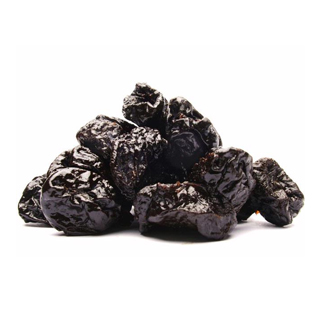
| Plums, Dried (prunes), Uncooked | |
| 100 g | 1 cup, pitted (174 g) |
| Protein: 2.2 g (4% DV) |
Protein: 3.8 g (8% DV) |
The protein level of prunes is roughly 2.2g of protein per 100g – a pretty good level as for a fruit. Prunes are distinguished by their ability to improve digestion, but this isn’t their only advantage. This fruit is a good source of phenols – substances, which are needed to maintain the good condition of heart. They are also rich in fiber, which helps to keep cholesterol and sugar levels stable. Prunes contain vitamins of group B, vitamin C, PP, potassium, sodium, magnesium, phosphorus and iron. This product helps to fight diseases of mouth cavity, normalizes blood pressure, increases performance ability and even fights cancer!
5. Avocado
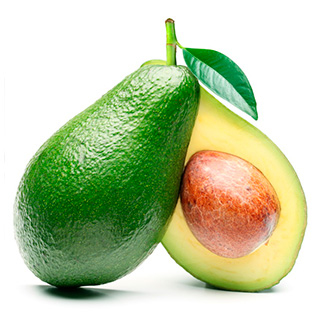 Types of Avocado High in Protein (100g):
Types of Avocado High in Protein (100g):
| Avocados, Florida | |
| 100 g | 1 fruit without skin and seeds (304 g) |
| Protein: 2.2 g (4% DV) |
Protein: 6.8 g (14% DV) |
Avocado, an indispensable part of many healthy diets, contains 2g of protein per 100g. Although it’s mostly valued for its healthy fats, avocado is a decent source of plant protein as well. This fruit comprises oleic acid, which prevents cholesterol formation and decomposes the existing cholesterol. As for the vitamins, it's rich in vitamin C, PP, D and vitamins of group B. Avocado boosts the memory, decreases the risks of cardiovascular diseases and enhances the ability to endure stress. It also decreases the blood pressure, so it’s recommended for people with hypertension. This fruit is also helpful in case of anemia, because it contains copper, iron and vitamin B2 – the important substances, which take part in blood-making.
6. Currants
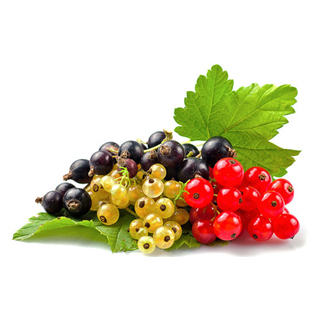 Types of Currants High in Protein (100g):
Types of Currants High in Protein (100g):
| Currants, Red And White | |
| 100 g | 1 cup (112 g) |
| Protein: 1.4 g (3% DV) |
Protein: 1.6 g (3% DV) |
Currants – a bright way to add fiber, protein and essential minerals to your nutrition. Currants are not only delicious, but also incredibly useful! They contain 1.4g of protein, vitamins B and PP, A, pectic substances, iron and phosphorus. 20 berries will be enough to cover your daily need of vitamin C. Currants can prevent cancer, cardiovascular diseases and diabetes. Moreover, this berry will help your eyesight stay sharp. Currants have anti-inflammatory properties and boost the immune system. Good news is that currants preserve all the useful properties throughout thermal conditioning, such as freezing and boiling, so currant jam is a good way to boost you immune system at winter.
7. Raspberries
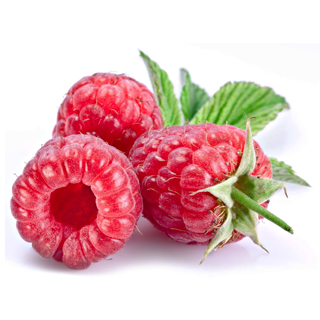
| Raspberries | |
| 100 g | 1 cup (123 g) |
| Protein: 1.2 g (2% DV) |
Protein: 1.5 g (3% DV) |
Raspberries – this fruit contains 1.2g of protein – not so much, especially compared to meat or beans. However, they are very beneficial for your health, because these berries are a powerhouse of vitamin C (which protects the body from harmful environment), salicylic acid (which is a unique anti-inflammatory and anti-febrile substance) and anti-oxidants (which protect our youth and vigor). Moreover, raspberries contain a wide array of minerals, vitamins and fiber, which makes them even better! They also improve the function of kidneys and digestive system. As in the case of currants, this berry keeps all the benefits after being cooked.
8. Bananas

| Bananas | |
| 100 g | 1 medium (7 inch to 7-7/8 inch long) (118 g) |
| Protein: 1.1 g (2% DV) |
Protein: 1.3 g (3% DV) |
Bananas are a traditionally good choice for a snack because they are easy to buy and have their own natural "package". Bananas contain 1.1g of protein, which is highly digestible. Enjoying bananas regularly will keep your digestive system in shape and your blood pressure in line. Besides potassium and protein, bananas will also help you top up your fiber for the day. Enjoying a daily banana can help you maintain a healthy weight, improve your digestive system, and because of the potassium they contain can help keep your blood pressure numbers in line. Bananas are loaded with vitamin E, which is responsible for a healthy reproductive system and skin condition.
9. Peaches

| Peaches | |
| 100 g | 1 medium (2-2/3 inch dia) (150 g) |
| Protein: 0.9 g (2% DV) |
Protein: 1.4 g (3% DV) |
Peaches contain only 0.9g of protein, but they deserve their place on the list due to their numerous benefits. They have a general strengthening effect, which comes in handy while recovering from long illnesses. Peaches are rich in potassium, phosphorus and potassium. This fruit enhances the immune and cardiovascular system. Peaches are a source of beta-Carotene, which is needed for good eyesight, especially if you spend a lot of time in front of your computer. Due to the fiber they contain, peaches are often included into weight loss programs.
10. Grapefruit
 Types of Grapefruit High in Protein (100g):
Types of Grapefruit High in Protein (100g):
| Grapefruit, Pink And Red, All Areas | |
| 100 g | 1 fruit (3-3/4 inch dia) (123 g) |
| Protein: 0.8 g (2% DV) |
Protein: 0.9 g (2% DV) |
Grapefruit, which is also called a "paradise fruit" has 0.8g of protein and many other pros – it decreases the cholesterol level, has antibacterial, antifungal and fat-burning effect, improves the carbohydrate metabolism, and, consequently, helps to fight diabetes and obesity. In addition to its weight loss benefits and protein, grapefruit is also an exceptionally good source of Vitamin C, like most citrus fruit. Due to this, grapefruit can strengthen your immune system, which makes it a great fruit to eat through the winter, when the flu and other nasty viruses are being spread uncontrollably.
